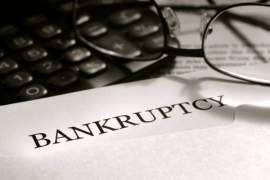
Illinois Bankruptcy

A Brief Guide to Illinois State Bankruptcy Law
Before Filing
Every U.S. state requires that its citizens go through credit counseling before filing for bankruptcy. The counseling must occur in the 180 day period prior to the filing for bankruptcy, and at its completion the filer will be given a certificate that must be given to the bankruptcy judge at the completion of the bankruptcy hearing.
Filing for Illinois State Bankruptcy
Illinois residents can file for bankruptcy at any Illinois branch of the United States Bankruptcy Courts. These include 219 S. Dearborn in Chicago, 211 S. Court Street in Rockford, 600 E. Monroe Street in Springfield, 201 N. Vermilion Street in Danville, 100 N.E. Monroe Street
in Peoria, 750 Missouri Avenue in East St. Louis, and 301 West Main Street in Benton. You may also be able to file by mail, but contact the court first to learn more.
Each different type of bankruptcy requires filling out many different kinds of forms, too many to name here. Once you know the type of bankruptcy you’d like to file, go to this site for a complete list of the different forms you’ll need.
Go to court with all the appropriate forms filled out. When you file, you’ll need to pay a large filing fee. For Chapter 7, it’s $306, for Chapter 11 $1046, and for Chapter 13 it’s $281. If you are unable to pay at once, you may be able to pay in installments. However, the fee is rarely if ever waived.
Different Types of Corporate Illinois Bankruptcy
• Chapter 11: This helps businesses get back on track with the assistance of a Illinois bankruptcy court. A judge helps the business work on a plan to repay debt and restructure the business so that it is more profitable, and in the meantime all debt payments are temporarily suspended.
• Chapter 7: This is the option for those businesses that don’t believe Chapter 11 will be able to help their business to become profitable. Its main concern is the sale of assets to raise money for creditors. The company is still liable for any debts not paid off through liquidation, which usually prevents the business from continuing.
Personal Illinois Bankruptcy
• Chapter 7: This is the most common type of personal bankruptcy, and it’s governed by the same principal as with corporate Illinois bankruptcy Chapter 7. All assets an individual possesses, or those not judged exempt such as clothing and other small personal possessions, can be sold by the court for liquid assets to be used for creditor payments. Unlike with corporate Chapter 7, most debts not covered by asset sales are discharged by the court so that the individual is not liable for them.
• Chapter: 13: This is a restructuring Illinois bankruptcy usually used by individuals, similar to Chapter 11 for businesses. (Actually, Chapter 13 is available for businesses too, but only the smaller ones are eligible, and Chapter 11 is available for individuals, but only the wealthiest with the most debt qualify.) It centers on a repayment plan that purports to allow the individual to pay off their debts via their discretionary income over the course of three to five years. Perhaps the number one reason that individuals pursue Chapter 13 bankruptcy is that they earn too much money to qualify for the quicker, easier Chapter 7, as Illinois cuts the line at the Illinois median income, or according to the Illinois Means Test.
The Limits of Illinois Bankruptcy
Unfortunately, the Illinois courts where you file for bankruptcy are powerless in the face of one type of debt: tax debt. Since most bankruptcy laws do little to help alleviate tax debt, individuals suffering from it should consult an Illinois bankruptcy lawyer and ask how to best pay off this debt.



















